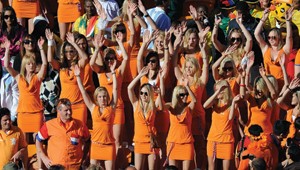O is for offense.
In the sports event industry, sports organizations must be on the offensive to prevent ambush marketers from compromising their brand identity and the integrity of their sponsors’ brands.
Ambush, a form of guerrilla marketing, is a marketing campaign occurring around a public event, typically a major sporting event, and involves circumventing payment of a sponsorship fee. Many companies pay hundreds of thousands, even millions, of dollars to sponsor an event in exchange for exclusive advertising rights before a large, captive audience.
Sports marketing experts Simon Chadwick and Nicholas Burton of the Centre for the International Business of Sport located at the Coventry University Business School in the United Kingdom, estimate the amount spent on exclusive sponsorships in 2009 was $43.5 billion. That’s billion, with a B.
Ambushing occurs when competing companies promote their brands despite another company having paid a handsome sum to market their brand as the official, exclusive event sponsor. Organizations including venue owners, leagues and teams are then left scrambling to come up with an effective deterrent in response.
Chadwick submits that many organizations have trouble appreciating what ambushing means for them because they are preoccupied with sponsorship sales rather than sponsorship management. Unless organizations adopt a proactive strategy for dealing with ambushers, we will continue to see more and more unwelcome ambush campaigns and unhappy sponsors as a result. For example:
During the 1996, at the Summer Olympics in Atlanta, British sprinter Linford Christie wore contact lenses bearing the Puma logo at a news conference held before the 100 meters final. Reebok had paid $40 million to be the official sponsor of the Games.
At the 2006 World Cup, fans of the team from Netherlands sported orange lederhosen, which had been provided by Bavaria brewery. Stadium officials responded by forcing those wearing the brightly colored trousers to remove them if they wanted to be permitted inside the stadium. Budweiser was the official World Cup beer.
 |
GETTY IMAGES
Charges of ambush marketing were leveled against Bavaria beer after a group of women at a World Cup match shed their top layer of clothing to reveal the orange mini-dresses. |
More recently, during the World Cup match between Netherlands vs. Denmark last June 16, Bavaria was at it again. During the match, nearly 40 Dutch women stripped out of the clothes they had worn into the stadium to reveal bright orange mini-dresses. The mini-dresses incorporated the color of the Dutch national team, but also bore a small logo identifying Bavaria brand beer. The dresses were distributed as part of a giveaway campaign with the purchase of an eight-pack of beer.
The choreographed striptease would not have posed such a problem were it not for the fact that Budweiser was the official beer of the World Cup. Both FIFA and Budweiser cried foul. The two ladies considered ringleaders of the mini-dress campaign were arrested by Johannesburg police and their passports were confiscated. Charges against the ladies were dropped, and their passports returned. Bavaria entered into a confidential settlement agreement with FIFA through the end of 2022.
According to Rob Prazmark, president of 21 Sports & Entertainment Marketing Group, a more appropriate description for ambushing is “parasitic marketing.” Companies that engage in this tactic do so in a way that damages legitimate properties, negatively affecting their ability to reap the benefits of the good will they have worked so hard to create, and in this case, paid large sums to exclusively promote.
As one of the founders of The Olympic Partnership program, Prazmark’s approach for effectively dealing with ambushers has included a successful PR campaign involving communication with nonsponsors before big events, letting them know that the host organizations are on the lookout for ambush activity, emphasizing that it hurts athletes, teams, sponsors and even the communities the nonsponsors serve. Prazmark challenges nonsponsors to do the right thing and focus their marketing efforts elsewhere, rather than “denigrating someone’s legitimate interest in supporting an event.”
So how can organizations score against ambushers? Daren Libonati, president of Justice Entertainment Group and former executive director of the three special-event venues at the University of Nevada-Las Vegas, encourages a proactive strategy as well. “Articulate what to expect,” so ambush activity will be reported, because everyone from ushers to executives knows it does not belong at the event. Michael Pine, formerly with Zuffa LLC, owner of the Ultimate Fighting Championship, and now chief sales officer of the World Triathlon Corp., agrees. “Set the right precedent” by preparing all those involved to prevent cannibalizing a sponsor relationship.
The overriding response in the sports industry is that communication is key. From creating a style guide for athletes to a pre-event punch list educating the key organization players, the more information shared, the less likely an ambusher will successfully infiltrate an event.
Nikki Hart, assistant counsel for the NFL, said the league’s proactive approach serves dual purposes: protecting the NFL and its sponsors. Because there are so many ways to ambush, “the best defense is an aggressive offense.” She added, “The bigger circle of rights we can carve out, the further back we can [push] ambushers.”
In addition to developing and protecting its intellectual property rights, the NFL considers whether it can complement its efforts through well-crafted rules and policies, including player conduct rules and ticket-back and media credential language, all of which are carefully crafted to best protect the rights of the league and its sponsors.
Trademark protection is a critical step in insulating organizations from ambushers. Organizations that stay one step ahead by proactively shoring up their trademark rights will be the winners. Otherwise, their bargaining power for generating sponsorship revenue and the ability to protect their own brand identities may be irreparably ambushed. &;
Linda Norcross (lnorcross@lrlaw.com) is a senior associate in the intellectual property group with Lewis and Roca.





